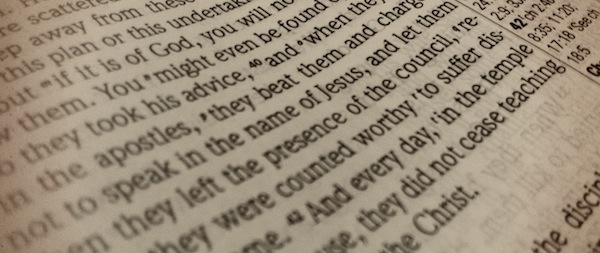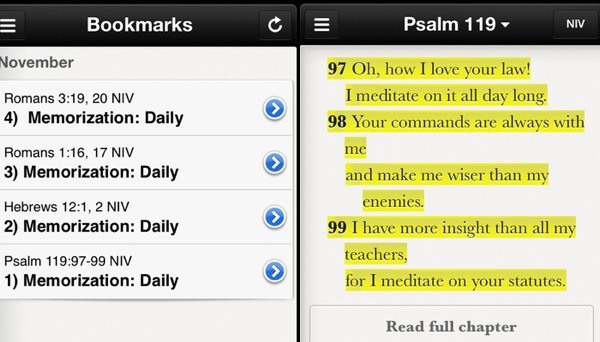 [This is Part 2 in an interview with Ken Chitwood regarding his vocation as a volunteer bartender at a local brewery in Texas. Check out Part 1, Pouring Beer for the Glory of God]
[This is Part 2 in an interview with Ken Chitwood regarding his vocation as a volunteer bartender at a local brewery in Texas. Check out Part 1, Pouring Beer for the Glory of God]
Mission happens in whatever places God places you. You have been placed in your family and therefore have a calling to live out your faith in that family and be a blessing to your family. You have been placed placed in your neighborhood and have a calling to that community. And if you happen to a be a beer connoisseur, who likes to drink craft beer at the local microbrewery, God may have even placed you there for the sake of his kingdom. And I don’t mean, you should start bringing bible tracts to the bar with you..unless you want to get treated as if you ordered a Coors or a Miller Lite.
In order to explore what this looks like in the craft-beer world, I asked my friend Ken a series of questions about God’s calling as he volunteers at a Texas micro-brewery. In Part 1 of our interview Ken discussed pouring beer for the glory of God. Ken Chitwood works at Crosspoint Community Church and Memorial Lutheran Church, both in Katy, Texas. He blogs at Sacred Duty and is a phenomenal preacher. Ken also is a volunteer bartender at a micro-brewery. Ken has become a good friend in the past year and has been a huge help challenging me specifically in the area of preaching.
RJ: Why a brewery? If you're looking to be bi-vocational, there are plenty of other places you could work, so why pouring beer for people?
Ken: As a bi-vocational minister I’ve worked as a security guard, a graphic designer and an assistant on a dairy farm. Here in Texas I applied to work at a running store, manage a wine bar and be a brewery volunteer. The latter made the most sense because this was a world that a missional community I lead was a part of already and seeking to actively bless with our presence and our gifts. I like to drink beer. I like to share beer with others. Checking IDs, helping with bottling and pouring taps at our Saturday tastings seemed an easy way to get to know people, deepen relationships and bless people on a regular basis.
RJ: Church people hanging out in bars isn’t really a new thing. Some of the early reformers hung out and discussed theology in taverns and that shaped the trajectory of Christianity for hundreds of years to come. How might what we talk about in bars today shape Christianity in years to come?
Ken: Excellent question, a couple things come to mind here RJ. The missional community I lead is called “The Publicans.” This is an intentional name with four motivations:
- In the past, local publicans (in Roman usage these were public contractors or tax collectors) were entrusted with a community’s beer supply. They doled it out as trusted members of the civil authority and as people with a firm foot in the community. Hence, people would go to “the publican’s” for a fine ale. This eventually got shortened to “the pub.”
- Pubs, especially in British contexts, can often become the focal point for a community - the place where the community gathers to drink, talk and share life together.
- The publicans were seen as a sinful and traitorous lot in Jesus’ day. Still, the disciple Matthew was a publican…but he was called by Jesus to follow him. We too, as sinners in the contemporary scene, are publicans called to follow Jesus as sinner-saints.
- You bring this all together and we are people who drink beer, follow Jesus and gather together as a community - we are “The Publicans.”
This type of Christian community opens our eyes to a few important aspects of following Jesus in the 21st-century world.
We need to live out the life of a disciple, and extend the community of Christ, wherever we go - including the pub. And if the pub is the place where the community is gathering, as the brewery I volunteer at is, then that’s where Christ followers should be. Not as “undercover evangelists,” but as human beings trying to bring healing, illumination and hope as we all fumble, falter and fail in our following of Jesus. It’s just one more step in trying to break down walls between the local community that we live in and the Christian community we worship in. The pub can be sacred space, and God is already at work there, so I don’t see why we shouldn’t be there too, mindful of how Jesus may be calling us there to be his ambassadors of reconciliation.

Beer, Orthodoxy, & Orthopraxy
Ken: Also, there was a study done to compare the impact of coffee and beer on the human mind. The researchers wondered which libation would make you more focused, more creative. They found that coffee, in moderation, makes you more focused - it helps you zero in on details and take care of business. It’s a left brain stimulant. Beer, and alcohol in general, again in moderation, opens you up creatively, releasing your right-brain resourcefulness, vision and innovation. For so many years the Christian church has done a great job of drinking coffee and eating stale donuts, and our theology and practice reflects that. We know our stuff, we’ve whittled down the details and rounded up all the informational theology we can handle. The problem is, we’ve self-segregated and stopped innovating. In all our coffee-induced theological focus, we’ve lost sight of the expansive, re-creative, enterprising work of the Holy Spirit in the marginal places of our world, in the community squares and local pubs. If we could adopt a bit more of a beer-drinker’s mentality to orthodoxy, and orthopraxy, I think we’d see some pretty cool innovation when it comes to imagining how the Gospel can indwell in our particular cultural context and historical moment. Plus, we’d have a TON of fun along the way.
RJ: There’s a growing popularity of things like bible studies at bars, beer & hymns, church plants in pubs, etc. With the popularity of craft beer, so it seems the popularity of Christians hanging out in bars. What would be one warning you would give to the Christian who wants to be on mission by going to the bar?
Ken: Right from the outset we wanted to be aware of two things as we waded into this world.
First, we wanted to watch out for alcoholism. If we saw it creeping up in us, or taking hold of others we met, we wanted to be mindful of it and do what we could to release and liberate people from it. Alcoholism destroys lives and ushers all types of sin, death and destruction into one’s life-orbit. We wanted to work at confronting this with the Law, releasing people with the Gospel and leading them into a new humble obedience of life-long recovery. At the same time, we wanted to learn from those who were recovering alcoholics - they have some of the best redemption stories in the world and know what it means to be an ever-recovering sinner-saint.
Second, we wanted to avoid the “Vegas” problem, or at least be prescient of it. When people drink, they get, as the rapper-cum-theologian Yeezus would say, "cray-cray.” Basically, people do stupid stuff when they drink. We really don’t want to drink too much, act a fool and regret a bunch of stuff later. We don’t want to see marriages ruined with one-time uninhibited adulterous flings or words to drunkenly escape someone’s mouth and cause untold, and unintended, damage.
I can’t say things have gone perfectly. Sometimes we drink too much. Sometimes we make mistakes. Sometimes we aren’t as aware as we need to be. It’s a different set of sins than what you typically deal with as part of a typical congregation. Still, it creates opportunities for confession and absolution, for confrontation and forgiveness, for repentance and restoration. That’s what being a follower of Jesus is all about anyways, whether there is beer involved or not.
Photo Credit: Corey Grunewald Photography
 God has not called me to play professional basketball. This might be obvious to you, as it should be. I’m hardly tall enough to be a basketball player. My genetics don’t lend themselves very well to me having a fighting chance in the NBA. I have a wimpy vertical leap. And while I may brag about my jump shot, I’m not very agile and have mediocre ball-handling skills. Professional basketball is not in the cards when it comes to my calling. God has not given me the skills to be a professional basketball player and no amount of hope, dreams, or commitment is going to get me there. I enjoy playing basketball, but my skills are limited.
God has not called me to play professional basketball. This might be obvious to you, as it should be. I’m hardly tall enough to be a basketball player. My genetics don’t lend themselves very well to me having a fighting chance in the NBA. I have a wimpy vertical leap. And while I may brag about my jump shot, I’m not very agile and have mediocre ball-handling skills. Professional basketball is not in the cards when it comes to my calling. God has not given me the skills to be a professional basketball player and no amount of hope, dreams, or commitment is going to get me there. I enjoy playing basketball, but my skills are limited.
 [This is Part 2 in an interview with Ken Chitwood regarding his vocation as a volunteer bartender at a local brewery in Texas. Check out Part 1,
[This is Part 2 in an interview with Ken Chitwood regarding his vocation as a volunteer bartender at a local brewery in Texas. Check out Part 1, 





 Memorizing scripture can be a daunting and intimidating task. I have oftentimes made well-intentioned efforts to memorize both long and short passages of scriptures, knowing that there is something significant about the discipline of memorizing bible verses. Recently I was introduced to a system for memorizing scripture that still requires discipline, but also will set you up to make scripture memorization a part of your daily devotional life and doesn't take much more than five minutes a day.
Memorizing scripture can be a daunting and intimidating task. I have oftentimes made well-intentioned efforts to memorize both long and short passages of scriptures, knowing that there is something significant about the discipline of memorizing bible verses. Recently I was introduced to a system for memorizing scripture that still requires discipline, but also will set you up to make scripture memorization a part of your daily devotional life and doesn't take much more than five minutes a day.


